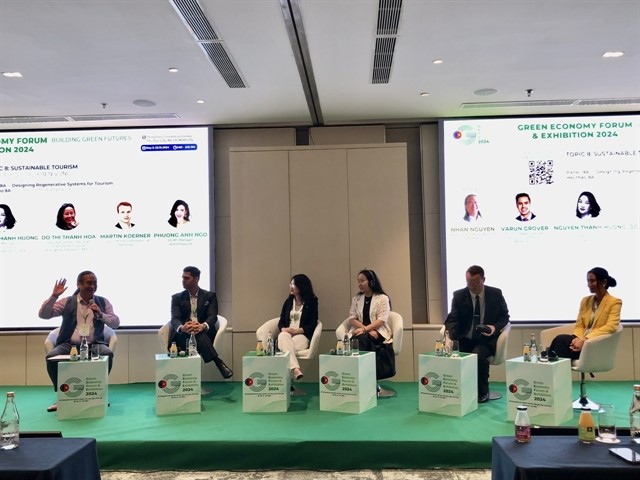Việt Nam eyes regenerative tourism through sustainable practices, solutions: GEFE 2024
Việt Nam is exerting efforts to create a regenerative tourism industry by incorporating practical green solutions and sustainable practices, experts said at a conference about regenerative tourism on the second day of GEFE 2024.

Việt Nam is exerting efforts to create a regenerative tourism industry by incorporating practical green solutions and sustainable practices, experts said at a conference about regenerative tourism on the second day of the Green Economy Forum and Exhibition 2024 (GEFE 2024).
The conference brought together experts and business representatives in the field of tourism to discuss sustainable practices and initiatives for building a regenerative tourism system.
Speaking at the conference, Nguyễn Nhân, associate lecturer at RMIT University, said it is important to understand the difference between sustainable tourism and regenerative tourism.
“While sustainable tourism is to minimise the social impact on the environment, regenerative tourism focuses on enabling communities and ecosystems to evolve, renew, and restore,” he said.
Deputy Director General of the Institute for Tourism and Development Research Đỗ Thị Thanh Hoa said regenerative tourism is a new term deemed “a social necessity and a goal for the country in this century”.
To make this possible, the industry “has been actively adopting practices and initiatives in green transition, green economy, and green development, all of which are to foster holistic growth for regenerative tourism,” Hoa said.
She added that the Ministry of Culture, Sports, and Tourism has carried out plans and activities to help the industry achieve a sustainable and regenerative outcome.
It has also developed new tourism models such as green tourism, ecotourism, and community tourism, along with encouraging businesses to adopt green and digital transitions.
“We have seen a majority of accommodations and service providers using renewable energy and wastewater management systems. This is a testament to the effort made and shows the potential growth of regenerative tourism in the future,” she said.
Nguyễn Thanh Hương, country manager of the International Air Transport Association (IATA), said the aviation industry, which is a key enabler of tourism, has also taken innovative actions.
It has been focusing on four pillars: using aircraft that are fuel efficient, operating sustainably, implementing carbon offsetting, and using sustainable aviation fuel (SAF).
Hương said SAF not only consists of biofuel but is also derived from domestic waste, used cooking oil, and food waste.
But the SAF has not been widely used, and there lacks a national roadmap to develop this potential material.
“Thus, there needs to be a joint effort between ministries and IATA to make SAF more common to aviation businesses.”
Meanwhile, Ngô Phương Anh, HCM City manager of the agricultural organisation VietHarvest, said the amount of food loss and waste from the tourism industry is alarmingly high.
“Although the food is untouched, it goes to waste at the end of the day due to the strict standards of restaurants, hotels, and supermarkets,” she said.
Anh said her company collects unused, edible food, and distributes them to charity organisations and underprivileged people.
“Since 2020, we have rescued over 40 tonnes of food from restaurants, hotels, and supermarkets. By doing this, we hope to effectively help minimise food loss and waste and food insecurity,” she added.
Varun Grover, country head of travel company booking.com for Việt Nam said the key to engaging tourists in building regenerative tourism is to connect customers with the right service providers.

“Our recent report shows that 94 per cent of our customers want to travel more sustainably, and 43 per cent of them think they can have a positive influence on the social impacts of travel. We have been analysing customer insights to optimise our marketing and trip planning features to help tourists match with the right providers and engage in green and sustainable activities,” he said.
Certifications and eco-labels in sustainable practices would also help tourism businesses be more recognisable to customers, he added.
Martin Koerner, commercial director of The Anam Resort, said it is also crucial to educate young generations on environmental protection and green, regenerative tourism.
“We are the environment, and the environment is us,” he said, “so we need to be responsible today for a better future.”
Taking place through October 23, GEFE 2024 brings together stakeholders from businesses, government, and non-governmental organisations from Europe and Việt Nam to engage in meaningful discussions and advocate for sustainable practices, policies, and initiatives. — VNS





